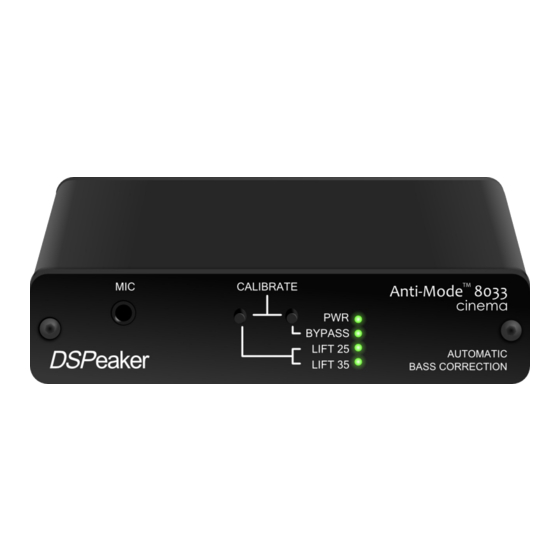DSPeaker Anti-Mode 8033S-II Manuel de l'utilisateur - Page 9
Parcourez en ligne ou téléchargez le pdf Manuel de l'utilisateur pour {nom_de_la_catégorie} DSPeaker Anti-Mode 8033S-II. DSPeaker Anti-Mode 8033S-II 20 pages. Automatic subwoofer equalizer

A
-M
8033
/ 8033S-II
NTI
ODE
CINEMA
Whenever the placement of the subwoofer or listening position changes (or the dipole correction
has changed in Anti-Mode 8033S-II), the initial calibration should be performed again to ensure an
optimal result.
2.4. Subwoofer Placement
There are several opinions available on how to determine the best place for your subwoofer. Due
to room reflections creating resonances, some frequencies are amplified (room modes / peaks)
and some are attenuated (nulls / dips). Without a sub EQ device, you need to locate the
subwoofer in a place that creates the flattest possible response in your room.
This is not what you want with Anti-Mode. With the Anti-Mode you do not need to be concerned
about room modes because they are effectively corrected. Instead, you should concentrate on
minimizing the number of nulls, because these cannot be corrected by a sub EQ device.
If you are not happy with your subwoofer performance in its current location, try locating the
subwoofer in a corner of the room. This causes the room modes to be excited maximally, but
reduces the occurrence of nulls. The boundary reinforcement from the corner walls also allows the
sub to reproduce lower frequencies without using extra power. Run the Anti-Mode calibration after
relocating the subwoofer.
Therefore, what was once considered the worst place to locate a sub is now the best place when
using Anti-Mode!
2.5. Cross-Over Frequency
The appropriate cross-over frequency to use depends on the capabilities of the subwoofer and
main speakers. For best results, the main speakers should be set to 'small' in the AVR so only the
subwoofer (whose response is corrected) is responsible for reproducing the low frequencies.
With Anti-Mode the subwoofer integration through the AVR should be more effortless. You are now
able to use a higher cross-over frequency than the standard 80Hz setting without the sub
becoming localizable. We recommend trying 100Hz or 120Hz cross-over settin, but because there
are varying differences between individuals, let your ears decide which setting is best for you.
Rev. 2.0
18.06.2012
Page 9 (20)
